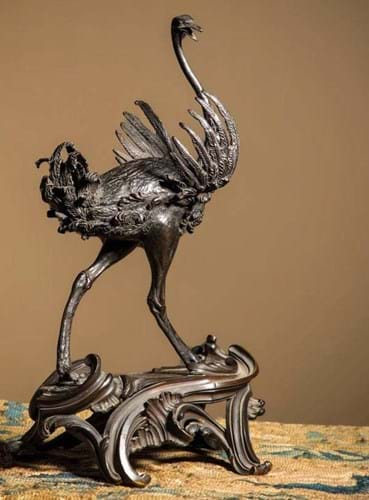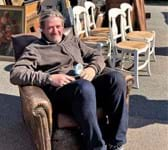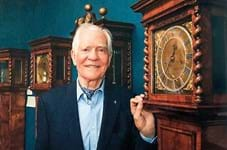
Offered with an estimate of £80,000-120,000 on the second day of the April 21-22 Cheffins auction, it took over 20 minutes to sell as a bidder in the room and another on the phone went head to head, at times with the lot rising in increments of £5000.
It was eventually knocked down to the room bidder, a UK-based private buyer, at £1.41m (plus 24.5/20/12.5% buyer’s premium). It was underbid by the European trade. The sum was a house record for Cheffins and generated a round of applause in the saleroom.
The former record was a previously unrecorded canine portrait by the Italian Old Master Giovanni Francesco Barbieri, known as il Guercino (1591-1666), which sold for £570,000 in March 2018.
Finely crafted
Dating from the late 16th or early 17th century, the finely crafted and superbly detailed ostrich sculpture measured just 15in (38cm) high – including its later rococo base – making the price look even more notable given its small size.
It was one of only three known versions of the model attributed to the workshop of Giambologna (1529-1608), each impeccably chased but with subtle variations leading to scholarly debate over the exact hand that produced them.
One of the sculptures was previously owned by Adolphe Thiers, the president of France between 1871-73, and was bequeathed to the Louvre museum.
Another was purchased by antiques dealer Alfred Spero for £260 at the EL Paget sale at Sotheby’s, in 1949. Spero bought it on behalf of Lieutenant Colonel the Honourable Mildmay Thomas Boscawen and it is now in the Fitzwilliam Museum in Cambridge.
This third sculpture was bought by Horace Walpole between 1765-66 and, kept as part of his grand collection at Strawberry Hill House, was detailed in the volume A Description of the Villa of Horace Walpole… in 1774. It was then sold at the ‘Great Sale’ of Strawberry Hill in 1842. The buyer then at £50 8s was John Dunn-Gardner of Suffolk, who at the time styled himself as the Earl of Leicester.
Extensive research
The bronze was traditionally recognised as Giambologna’s work but recent research suggests it was the result of a collaboration with Pietro Tacca, the heir to his workshop. Director at Cheffins Martin Millard, who was on the rostrum, said: “While the family always knew they were in possession of something significant, it was following extensive research that we were able to trace the ostrich back to the Horace Walpole Collection at Strawberry Hill.
“This exceptional provenance ensured that the piece drew worldwide attention, with a series of both private and trade buyers coming to view the sculpture ahead of the sale.”
Read more about the sale in Pick of the Week, page 8.














